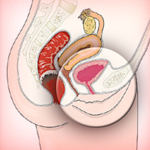Study Finds Pros and Cons to Vaginal Slings
 A study of vaginal slings has found that the devices have both benefits and drawbacks. On the positive side, the study found that vaginal slings can reduce the incidence of urinary incontinence in women who have had surgery to treat pelvic organ prolapse (POP). But on the negative side, women who had been implanted with slings were found to be at higher risk for bladder perforation and bleeding. The study was done by researchers at the University of Michigan in Ann Arbor and was published in the New England Journal of Medicine on June 21, 2012.
A study of vaginal slings has found that the devices have both benefits and drawbacks. On the positive side, the study found that vaginal slings can reduce the incidence of urinary incontinence in women who have had surgery to treat pelvic organ prolapse (POP). But on the negative side, women who had been implanted with slings were found to be at higher risk for bladder perforation and bleeding. The study was done by researchers at the University of Michigan in Ann Arbor and was published in the New England Journal of Medicine on June 21, 2012.
The vaginal slings that were the subject of this study are made of mesh about 1 centimeter wide and 10 centimeters long – smaller and narrower than the controversial vaginal mesh implant models that have been the subject of so many transvaginal mesh lawsuits. Still, these slings do carry some of the same risks.
Study evaluated how well slings control urinary incontinence
The study involved 337 women who were undergoing surgery to treat anterior prolapse. This is a condition in which the pelvic muscles have become too stretched or weak to support the bladder in its correct position. As a result, the bladder drops or bulges into the vagina. This gives the woman a feeling that something has dropped or is “coming down,” and can also cause pain during intercourse.
Surgery for this condition sometimes involves use of a vaginal sling. For the study, half of the women were implanted with Johnson & Johnson’s Gynecare TVT midurethral sling. The other women had surgery, but were not implanted with the sling. However, during the surgery, they were given incisions that mimicked the incisions they would have had with a sling.
The result was that one year after the surgery, 43 percent of the women the women with no sling suffered urinary incontinence, but only 27.3 percent of the women with the sling had this problem. Therefore, the sling was effective in greatly reducing the risk of urinary incontinence, although it did not eliminate the condition in all women.
Vaginal slings carry risk of complications
The vaginal slings did, however, carry a risk of complications from transvaginal mesh. The study found that the women who were implanted with the sling had higher rates of bladder perforation than the non-sling control group (6.7 percent vs. 0 percent), urinary infection (31 percent vs. 18.3 percent), major bleeding complications (3.1 percent vs. 0 percent), and incompletely emptying of the bladder (3.7 percent vs. 0 percent).
[SmartLink vaginalmeshlawsuit]

